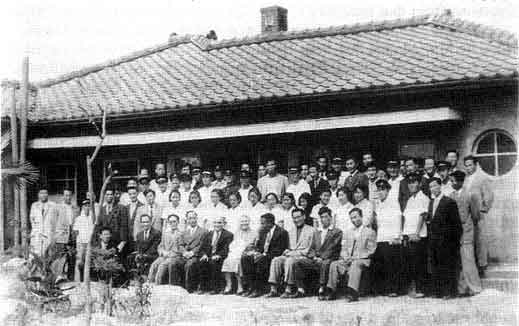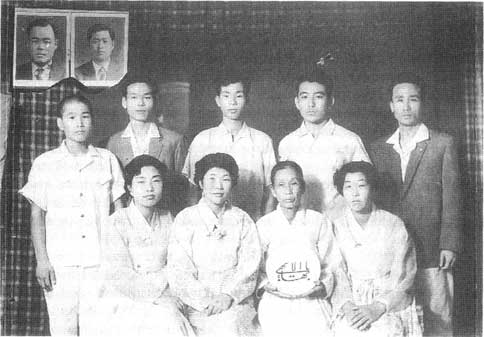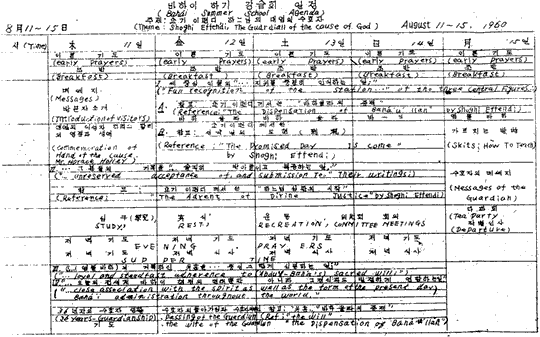
|
Raising the Banner in Korea:
An Early Bahá'í History
by Barbara R. Sims
 |
chapter 8 | start page | single page | chapter 10 |  |
Chapter 9
9. More About the Late 1950s
Although Korea had had Winter Schools and Summer Conferences, the first officially designated Summer School, under the Six Year Plan, was held in Kwangju in 1957. To establish Summer Schools was a goal of the Six Year Plan given by the Guardian to the new National Spiritual Assembly. The Kwangju Summer School was attended by Miss Alexander who visited Korea for the first time in her capacity as Hand of the Cause. The participants at the Summer School sent a message to Shoghi Effendi that 100 Bahá'ís and friends representing four Korean centers were pledging their efforts to achieve the goals of the Six Year Plan.The Guardian responded with a cable: "Delighted assure attendants fervent prayers extension activities consolidation newly born institution. Deepest love, Shoghi."
Mr. Noureddin Mumtazi, a pioneer in Japan who attended the Summer School, expressed surprise at how quickly the young Korean Bahá'ís had gained knowledge of literature and teachings of the Faith.

click for larger image
The first Bahá'í Summer School in Korea, held in Kwangju, September 28, 29, 30, 1957. Hand of the Cause Miss Alexander is sitting in the front row. To the right of her is Mr. Maxwell; to the left is Mr. Noureddin Mumtazi from Japan and next to him is Mr. Kim Chang-zin. Mr. Smits is second to the left of Mr. Kim. Over 100 Bahá'ís and their friends attended this highly successful summer school. To establish the institution of Summer Schools was one of the goals of the Six Year Plan given to the new National Spiritual Assembly of the Bahá'ís of North East Asia.
In July 1957 Mr. John McHenry III pioneered to Korea at the Guardian's suggestion. He settled in Kwangju and obtained a teaching position at Chosun University. By this time Mr. Maxwell had left Kwangju to take a position with the U.S. Army Education Center near Seoul.
Mr. William Maxwell was appointed Auxiliary Board Member in December 1957 by the Hands of the Cause in Asia. He was the first to be so appointed for Korea. As he was also the chairman of the National Spiritual Assembly of the Bahá'ís of North East Asia and had to go to Tokyo for the monthly meetings, he had much responsibility. Some years later, in 1962, Hand of the Cause Miss Alexander announced that Mr. Maxwell was appointed Auxiliary Board Member for Protection of the Faith. In those early days both Hands of the Cause and Auxiliary Board Members served on elected administrative institutions such as National and Local Spiritual Assemblies. This changed in Ridván 1963, when the Hands of the Cause decided not to serve on administrative institutions so as to leave themselves free to travel and teach the Faith. Auxiliary Board Members, with a few exceptions, also did not serve on administrative institutions from that time on.
That year, 1957, more literature was added. "Ten Lesson Course," written by Mrs. Mamie Seto, was translated and 700 copies were printed in November. It was revised and reprinted the next year. The material for the Ten Lesson Course, which was most useful for deepening the new Bahá'ís, was taken from Bahá'u'lláh and the New Era, which had not yet been printed in Korean.
In November the sorrowful news of the passing of Shoghi Effendi, Guardian of the Faith, shocked the entire Bahá'í world. One of the pioneers wrote of the memorial meeting in Kwangju. During the devotional services there was sudden wind and rain, cutting off the electricity. They continued their service by candlelight.
Still the teaching went on. The next day extension teaching was done in Mokpo, with 21 people present.
In December 1957 Mr. Kim Chang-zin went home-front pioneering to the unopened island of Cheju. Unfortunately he could not obtain work and was obliged to return to Seoul several months later.
In early 1958 Mr. Smits sent a report to the National Spiritual Assembly of North East Asia informing them of the passing of Mr. Moon Sam Suk, who had become a Bahá'í in Mokpo in 1956. "[His] devoted efforts in teaching the Faith and helping to organize the fireside in Mokpo will ever remain a matter of history. He is the first Korean believer to ascend to the spiritual world." In another report, the new pioneer to Korea Mr. John McHenry III commented, "The radiant soul of Moon Sam Suk, which was reflected so strongly in his gentle and cheerful face, will surely aid us in the erection of the assembly he worked so faithfully to see
created and which was the object of his highest hopes." Mr. Moon had exerted his utmost efforts and a report stated one result was a "small column in a Mokpo newspaper which mentioned the glorious word Bahá'í." At the time of his passing four persons were ready to declare their belief in Bahá'u'lláh and by April the first Local Spiritual Assembly was elected in Mokpo. The members were Mr. Yang Hyo Chong (chairman), Mr. Ahn Chull Soon (treasurer), Mr. Rhee Yeun Sup (secretary), Mr. Kim Dong Oun, Mr. 0 Sun Taek, Mr. Heo Man Sik, Mr. Rhee Bong Doll, Mr. Rhee Bong Keun and Mr. Rhee Chae Im. There were now thirteen Bahá'ís in that city; twelve men and one woman, all Koreans.
By mid-1958 there were more than fifty Bahá'ís scattered over seven localities which included three Local Spiritual Assemblies -- Seoul, Kwangju and Mokpo -- two groups and two isolated centers. The early Bahá'ís in Korea, even with few teachers available, were continually looking for ways to expand the Faith to other areas. Bahá'ís in the Seoul community made several teaching trips that year: to Taegu where they were interviewed by three newspapers; to Inchon for the first time where they looked for a permanent meeting place where they could have regular firesides; to Cheju Island where Mr. Kim was living; and to Koha Island. Mr. Yang Hyo Jong of Mokpo moved to Uijongbu thereby opening up another area.
That year, 1958, the Bahá'ís of Kwangju participated in the United Nations Day and Human Rights Day program sponsored by the United Nations Association. Mr. John McHenry III was the Bahá'í speaker. His talk, which was translated, was heard by about 1500 students. Other speakers included a congressman, a president of one of the universities in that city, the president of the Women's Association, director of the United States Information Service, and others. Mr. McHenry wrote that the number of students coming to the firesides increased after that occasion. He also sent a report referring to the Wolbo newsletter issued from Kwangju during 1956-1958, modeled after the Japanese Geppo.
The Seoul community was having two weekly firesides, one for students and one for adults. In an effort to hasten the deepening of new believers, the Seoul Assembly invited any Korean Bahá'í to come and spend the weekend at their Center, which was Mr. Maxwell's residence.
A study conference was held in Seoul in November, 1958 at which Mrs. Mamie Seto, Auxiliary Board Member from Hong Kong, was the featured speaker. The conference culminated in a public meeting at which Mrs. Seto spoke. It was attended by 50 people.
Kwangju held a similar study conference with Roy MacDonald, a U.S. serviceman from Seoul, as featured speaker.
During that year, 1958, the community benefited by the printing of 2,000 copies of Paris Talks, the first Bahá'í book in Korean. It was translated by Mr. Suh Eton. Two new pamphlets were also printed in
Korean, 500 copies each: "Bahá'í Answers", translated by Mr. Hahn Byoung Taek, and "Prophecy Fulfilled" by Elizabeth Cheney, translated by Mr. Rhee Chong Tae.

click for larger image
This was the Bahá'í community of Chunju in 1959. A report sent by the National Teaching Committee to the National Spiritual Assembly commented that they were proud of the record of the Bahá'ís of Chunju: that they had developed an independent initiative regarding pursuing Bahá'í activities and also had many women in the community.Some of the Bahá'ís in the photo have been identified. Front: Mrs. Kang Yung Hu and her sister Mrs. Kang Yung Oh, their mother Mrs. Kim Sun Duk and Ms. Choi Hio Sun. Standing far right: Mr. Kim Byung Ho and next to him Mr. Lee Myung Kyu. The community soon elected a Local Spiritual Assembly, the fourth for Korea. The report commented that Mrs. Kim, despite her age, became one of the most active promoters of the Faith. Her two daughters' husbands also became Bahá'ís. Local Spiritual Assembly members elected were Mr. Kim Byung Ho (chairman), Mr. Yang Sung Kwan (vice-chairman), Mr. Kim Kyoum Young (corresponding secretary), Mr. Rhee Sung Yul (recording secretary), Mrs. Kang Yung Oh (treasurer), Mrs. Kang Yung Hu, Mrs. Kim Sun Duk, and Mr. Kim Chung Bai.
In April 1959 the Chunju Local Spiritual Assembly was elected resulting in a total of four Local Spiritual Assemblies, and one group, Pusan. Isolated centers were Taegu, Hwasoon, Songjongni and a Korean army post. The total of Bahá'ís was given at 72. There were also seven rented Centers in different areas in which to hold meetings.

click for larger image
Commemoration of the Martyrdom of the Bab, 1959
The Bahá'ís of Seoul had an open air meeting in the historic Duk-soo Palace grounds, with prayers in two languages and an explanation of that special day. Front: Mr. Han Changgy, Miss Chee Hei Soon, and Mr. Chung Kwan Kuc. Middle: Mr. Maxwell, Capt. Kim Yong Kuen, and Capt. Im Pyong Mo. Rear: Mr. Kim Yong Yun, Mr. Roy MacDonald and Mr. Kim Chang-zin.
Later in the year reports mentioned that other goal cities, Suwon and Songjongni, both had groups and rented Centers where they could hold meetings. In March of that year, 1959, the secretary of the Seoul Local Spiritual Assembly sent a report of twenty adult Bahá'ís, which included two women.
In 1959 Mr. and Mrs. Son Chong Tae of Songjongni had the first Bahá'í marriage in Korea. He was a teacher in a high school and they were the only Bahá'ís in that city at the time. According to a report sent by Mr. McHenry, they moved into a poorly-heated room so they would be near to the place that was used as a Bahá'í Center.
Mr. Rhee Yeun Sup, who was secretary of the Local Spiritual Assembly of Mokpo, wrote to the Bahá'í Geppo newsletter in Japan of a teaching trip to Koha Island. Mr. Smits had visited the island two years previously with some language school students and now he suggested that some Bahá'ís go there for teaching. Five went, including Mr. Smits. They walked all over the island praying, meeting people, talking to everyone about the Faith. When they left they estimated that half of the island (700) had heard about the Faith. The Bahá'ís promised to send literature and to visit regularly. By late 1962 there were thirty-six Bahá'ís on Koha Island and the Faith had spread to neighboring islands.
The Summer School in Korea was now an institution. There was one in Kwangju the summer of 1959. Dr. Earl represented the National Spiritual Assembly of North East Asia. He also visited the Assemblies of Chunju and Mokpo.
That year the Bahá'ís of Kwangju participated in the annual United Nations Day ceremony for the second consecutive year. It was an even
larger event than the previous year. It seems that the small Bahá'í community seldom missed a chance to proclaim the Faith. They wrote that the results of even meager efforts brought about "overpowering confirmations."
The community in Seoul held what they said was perhaps their most successful public meeting to date. It took place at the Korean Government's Central Information Center and attended by 130 guests because it was advertised. Dr. David Earl was the principal speaker, with translation. The title of his speech was "The Coming World Civilization" and attracted much interest. There was only one woman present, a Bahá'í. The Local Spiritual Assembly secretary reported that the Bahá'í literature which was put out was "snapped up."
In late 1958 Mr. Dale and Mrs. Barbara Enger and their two young sons came to Korea to pioneer, settling in Pusan. With their dedicated assistance the community was able to elect a Local Spiritual Assembly in April, 1960. It was the fifth city in Korea to have a Local Spiritual Assembly. The Auxiliary Board Member described how the Local Spiritual Assembly of Pusan was elected: "Trusting in Bahá'u'lláh, we were able to compile a voting list of twelve names; eight active, two inactive and two we had never met. On April 19 the political situation erupted and curfew was imposed effectively canceling our meeting scheduled for the next evening ... we attempted to contact all the voting members to reschedule the election for the 21st. But the Bahá'ís gathered spontaneously on the afternoon of the 20th. The Bahá'ís in the Army managed to have their ballots delivered on the 20th. We rescheduled the election for the morning of the 21st ... two Bahá'ís went to the wrong place and had to be fetched. However, by the Grace of Bahá'u'lláh we have our treasured Local Spiritual Assembly."
Mr. Enger, who was the secretary, wrote a report of the activities some months before and after the election of the Assembly. The community had very structured activities. He told of the Sunday students' fireside with about five students attending regularly; an adult fireside with about four or five professors attending; a students' study class with about three students; an enrollment class of about three people, "one is ready"; a deepening class "held rather irregularly due to a series of weekend conferences." The special event that year was the observance of the Martyrdom of the Báb. Mr. Suh Byong In, chairman of the Assembly, was the speaker. His subject was "The Story of the Báb." Fifteen guests assembled for the observance.
In 1962 the Engers left Korea to pioneer in Taiwan.
This was the program of the Summer School in Kwangju, 1960. The concern for deepening the Bahá'ís is apparent.
 |
chapter 8 | start page | single page | chapter 10 |  |
|
|
